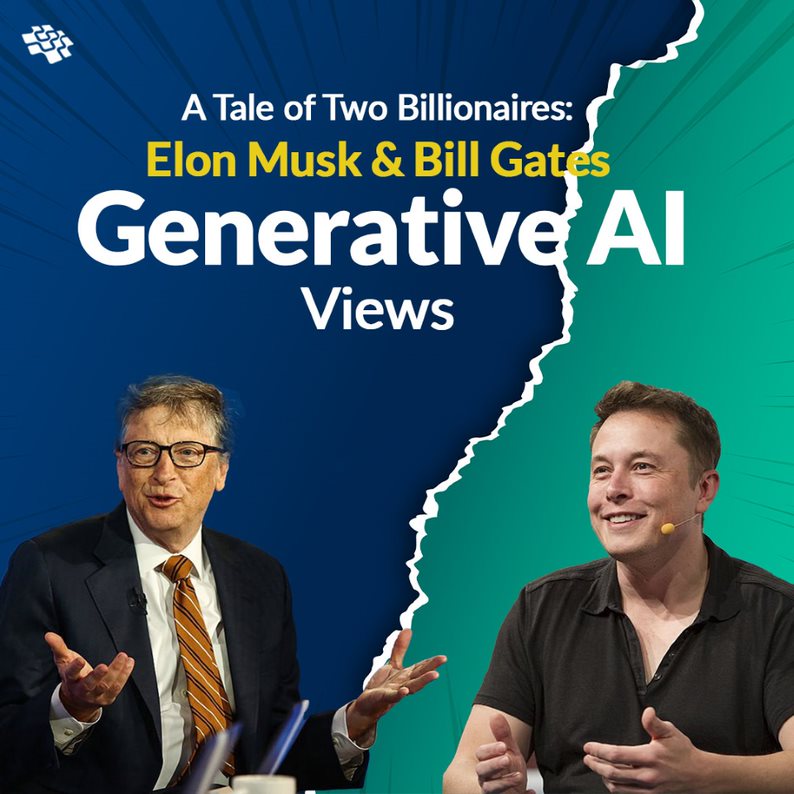A Tale of Two Billionaires: Elon Musk and Bill Gates’ Generative AI Views
Musk has voiced his concerns about the potential risks of Generative AI. He has been vocal about his apprehensions, which are rooted in the idea that the technology could eventually surpass human intelligence and become uncontrollable. In stark contrast, Bill Gates, views that Generative AI presents a powerful tool for innovation and creativity. He asserts that the technology could be leveraged to solve some of the world’s most pressing challenges, such as climate change, healthcare, and education.

This blog post aims to explore their opinions in-depth and examine the rationale behind their respective viewpoints.
Opinion of Elon Musk on Generative AI
Elon Musk espouses the perspective that Generative AI, with its innate capability to engender remarkably authentic fabricated content, possesses the potential to disseminate disinformation extensively, thereby manipulating public opinion. Musk apprehends that the repercussions of such a phenomenon on society and democracy may be severe and consequential.
In an interview, Musk said, “I think people should be really concerned about AI, especially if it gets advanced faster than we can understand its ramifications. People should be concerned about deepfakes.”
Of particular concern to Musk is the potential for Generative AI to create sophisticated and highly realistic fake content, such as deepfake videos. These videos use AI to fabricate authentic footage of individuals performing or saying things they never did. As a visionary entrepreneur and technologist, Musk is acutely aware of the potential benefits that AI can bring to society. However, he passionately believes that these benefits must be balanced against the potential risks posed by the technology.
Elon Musk’s recent announcement of the development of TruthGPT implies a recognition of the vast potential that artificial intelligence (AI) holds for generating positive societal impacts by promoting truth and accuracy. Given the alarming proliferation of misinformation and disinformation in modern times, the application of AI to analyze data and offer reliable information could significantly alleviate this societal problem.
Moreover, this announcement highlights Musk’s ongoing exploration of the multiple avenues by which AI can be leveraged to support truth and accuracy, while emphasizing the need for appropriate regulations and oversight to ensure the responsible and safe application of AI technologies.
Further read: How Artificial Intelligence (AI) Is Impacting Supply Chain Management?
Opinion of Bill Gates on Generative AI
Bill Gates exhibits a fervent and optimistic perspective of Generative AI and its applications. He contends that Generative AI is a paradigm shift that will facilitate novel opportunities and solutions for diverse domains and challenges. He also posits that Generative AI can be leveraged for benevolent causes and social impact, such as accelerating medical research, offering primary diagnoses, and augmenting education.
Gates, in a recent Forbes interview, expounded his view on the transformative potential of artificial intelligence (AI) in the healthcare arena, particularly in low-income nations. He firmly contends that AI can effectively bridge the considerable gaps in healthcare access and delivery and significantly enhance outcomes for the world’s indigent populations.
Bill Gates has confidence in OpenAI and other researchers to develop AI ethically and transparently. He also neglects to address any of the technical hurdles or constraints of Generative AI, such as data quality, scalability, robustness, or interpretability. He emphasizes more on the outcomes and impacts of Generative AI rather than the methods and mechanisms behind it.
“Although humans are still better than GPT at a lot of things, there are many jobs where these capabilities are not used much,” said Gates. Using data sets, he said that AI might be trained to “empower people to do this work more efficiently,” since occupations in sales and document handling demand decision-making but not the capacity for continuous learning.
Additionally, he emphasizes the potential for technology to catalyze breakthroughs in fields such as art and design, by allowing for the creation of new and imaginative content that was previously unimaginable.
Further read: How Generative AI Tools Like ChatGPT Could Transform Your Business?
Our Perspective on Generative AI
NextGen Invent embraces a profoundly optimistic perspective on Generative AI, acknowledging its vast capacity to usher in a paradigm shift across a myriad of facets within our existence. With its astounding skills, Generative AI opens a thrilling world of possibilities where the development of immersive virtual worlds, uncannily authentic characters, and interactive narratives takes unsurpassed relevance. By pushing the boundaries of imagination, this transformative technology gives us the astonishing capacity to convey previously unheard-of degrees of verisimilitude.
In a podcast with Scott Saunders, Deepak Mittal said, “Generative AI stands poised to play a pivotal role in aiding enterprises in attaining their sustainability objectives by discerning optimization prospects and furnishing profound insights into the ecological repercussions of diverse supply chain choices.”
Moreover, the advent of Generative AI holds the promise of an extraordinary transformation in the realm of content creation and customization. Utilizing the vast potential of this technology, we can give consumers the seamless ability to create visually personalized information that suits their individual preferences.
Despite being aware of the revolutionary possibilities of Generative AI, NextGen Invent continues to keep its unshakable commitment to ensuring ethical and responsible deployment. We place a high priority on protecting this technical marvel from any improper use while adamantly upholding strict rules that protect individual privacy.
Wrapping Up
In conclusion, while both Elon Musk and Bill Gates are tech visionaries for the advancement of artificial intelligence, their views on Generative AI differ significantly. Musk is sounding alarm for the potential risks of AI and the need for regulation, whereas Gates maintains a more optimistic and practical outlook, focusing on the potential benefits of AI while acknowledging the need for ethical considerations.
Ultimately, the debate over the future of AI and its impact on society is complex and requires thoughtful and nuanced discussions from experts in the field. As AI continues to rapidly evolve and shape the world around us, it will be important for policymakers, researchers, and industry leaders to consider the perspectives of individuals like Musk and Gates to ensure that AI is developed and utilized responsibly and beneficially.
Are you an enterprise dedicated to the pursuit of sustainability?
Contact us to assist you in realizing your objectives by harnessing the potential of Generative AI to optimize your supply chain and acquire profound insights into ecological impacts. At NextGen Invent, we uphold an unwavering commitment to ethical and responsible implementation.
Stay In the Know
Get Latest updates and industry insights every month.
